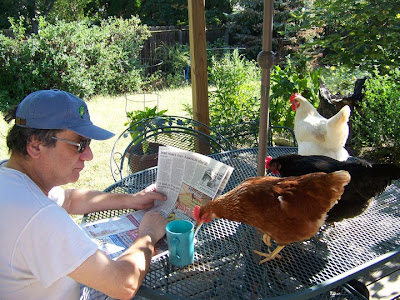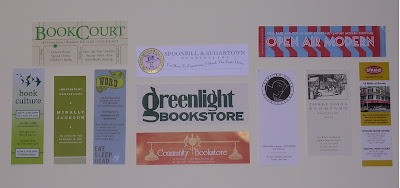BOOKS!!
The Somnambulist, Jonathan Barnes: One of the first fellow-bookseller recs I received when I started working at Watermark in, uhm, March 2008. The perils of the front list! For the first few hundred pages I kept worrying I was reading the wrong book after all--I was waiting for two characters to show up who didn't till very near the end--which anxiety messed with my enjoyment of the tale of a bit. You won't have that problem: you'll just rollick through a Holmesian, Poe-esque, relentlessly tongue-in-cheek murder mystery about an no-longer-young magician-detective; his hulking, silent, impervious, only-milk-drinking assistant (the Somnambulist of the title); circus freaks, secret agents, assassins, and Coleridge cults, all tied together by an enigmatic narrator who admits outright he plans to lie at times. Quite fun.
Flannery, Brad Gooch: More informative than enlightening. But really, as long as you quote her, it's impossible to write a bad biography of Flannery O'Connor, right?
Missing You, Metropolis: Poems, Gary Jackson: I won this in an Twitter contest in re: literary superheroes!!! Courtesy of the always fascinating Graywolf Press and my superheroine alter ego, The Editrix, pictured herewith:

[Note phalanx of red pens, and first edition Elements of Style. Not pictured: feline sidekick, The Independent Claws.] The book's a first collection by a poet from Topeka (Kansas--another connection! Though my only Topeka experience is field trips to the State Capitol. Look up our mural of John Brown: it is CRAZY SAUCE), strung together with comic-book ruminations, kind of a Midwestern, African-American Fortress of Solitude. It also reminds me of Krypton Nights, the (now sadly out of print) first collection by a poetry guru of mine, Bryan Dietrich. I think there's a strong argument to be made that the DC/Marvel universe is as important a source of shared experience and metaphor for our culture as, say, Homer was for the ancients: comic books are where our modern myths are created and revised.
Mr. Toppit, Charles Elton: Another Twitter score, sort of--went to my first-ever invited-as-a-book-blogger publisher-sponsored happy hour towards the end of last month (I skipped D&D for it! HUGE!!), at the charming and gracious behest of Other Press. Who, I'll have you know, published TWO of my favorites of the year: The Origin of Species (Nino Ricci) and Sarah Bakewell's brilliant Montaigne bio How to Live. The event was a great time, got me thinking more about expanding readership and reach and influence or whatever of this blog...and I totally forgot to pick up a copy of this novel, which I'd heard good things about. Luckily, Ms. Terrie Akers was kind enough to send it out, with impressive turnaround. Thanks!
(OK, one more side note: "Charles Elton" is just a straight-up Austen-character name, isn't it? I love it.)
Mr. Toppit--another winner. Hooked me with the first line: "And out of the Darkwood Mr. Toppit comes, and he comes not for you, or for me, but for all of us." EEK! It's the last line of what turns out to be the last book in "The Hayseed Chronicles," a series of Narnia-esque children's books that languish in obscurity until their British author, hit by a car, spends his dying moments with an American tourist adrift in her own life, who latches onto the books--and the man's family--and single-handedly creates a posthumous frenzy, turning the books into classics, their mysterious, sinister antagonist, Mr. Toppit, into a cultural icon. The author's son Luke, transmuted into the books as the main character, grows up twisted by his perceived notoriety; his older sister is similarly warped by the Chronicles' omission of her existence. It's a wonderful, dark story about stories, about the sometimes sick but inevitable feedback loop between books and life. And Elton does a marvelous job constructing the book's nesting flashbacks and revelations, both in the reality of the Haymans and the fiction of the Hayseeds--we read just enough of the Chronicles' weird and menacing prose to want to read them all, and at the same time to feel that we've read them before. I think Mr. Toppit deserves all the praise and exposure lavished upon the seriously disappointing The Magicians: better written, better plotted, infinitely more heartbreaking (and yes, wickedly humorous at times, as all the best dark books are).
Over Sea, Under Stone, Susan Cooper: Again, a fitting follow-up--a real beloved, dark children's classic. No clue how I missed the Dark is Rising sequence in my Narnia-and-Prydain days. I'm told that the conventional wisdom is actually to skip this one and head straight to the eponymous #2, and I can see why (this book is OBSESSED with logistics and maps and directions, which I am constitutionally incapable of following), but oh well, I'm a completist, and here at least I've been introduced to the Arthurian good-vs.-evil struggle that I presume makes up the narrative arc of the next four books.
See you next year.





























